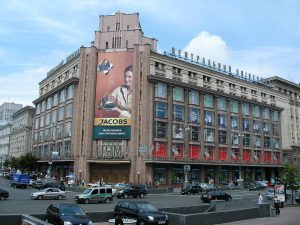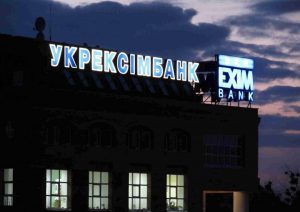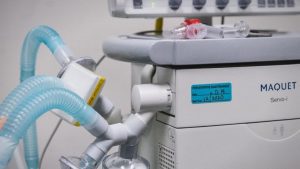
The main shareholder of PrJSC Ukraina Department Store, the manager of the shopping and entertainment center of the same name located at 3 Svobody Square in Kyiv, the Swedish company Quinn Holdings Sweden AB, has built up a 98.3% stake in the company and became the owner of a controlling stake.
According to the statement in the information disclosure system of the National Securities and Stock Market Commission, the relevant letter was received on May 19.
Thus, Quinn Holdings Sweden AB, together with affiliates, is the owner of 122,985,402 ordinary registered shares of the company, which is 98.372% of the total number of its shares. The ultimate beneficiary is Irish Bank Resolution Corporation (IBRC), Ireland’s state-owned bank.
According to the National Securities and Stock Market Commission, the net income of PrJSC Ukraina Department Store increased by 8.2% in 2017 compared to 2016, to UAH 155.7 million, while its net loss amounted to UAH 273.3 million against UAH 67.8 million of net income.

Ukraine’s retail trade turnover in April 2020 compared to the same month of 2019 in comparable prices decreased by 14.9%, while in March it grew by 6.1%, the State Statistics Service has reported. According to the service, in April, compared with March 2020, retail trade turnover decreased by 23%.
In January-April 2020 compared with January-April 2019, retail trade turnover increased by 3.2%.
The largest growth in the retail turnover of enterprises (legal entities and individual entrepreneurs) for the four months of 2020 compared to the same period in 2019 was recorded in Kyiv (by 10.5%), Zaporizhia (by 9.8%), Dnipropetrovsk (by 8.6%), Odesa (6.7%), Volyn (6.3%), Kirovohrad (5.3%), Kharkiv and Donetsk (4.9%), Poltava (4.5%) regions.
The service recalls that the data are given without taking into account the temporarily occupied territory of the Autonomous Republic of Crimea, Sevastopol, part of Donetsk and Luhansk regions.

The net loss of Ukreximbank (Kyiv) amounted to UAH 2.07 billion in January-March 2020, while for the same period in 2019 the bank declared UAH 395.32 million in profit, the bank said in the quarterly financial statements released on its website.
According to the statements, the bank’s net interest income amounted to UAH 325.99 million for the first quarter, which is 9.7% more than for the first quarter of 2019, while the net profit from investments in securities increased by 40.6 times, to UAH 2.44 billion.
The bank lost UAH 4.3 billion on differences in rates, while it earned UAH 407.74 million in the same period in 2019.
The bank’s assets increased by 6.9%, to UAH 150 billion, including loans to customers by 7.9%, to UAH 57.5 billion for the reporting period.
The bank’s liabilities increased by 10.8%, to UAH 145.58 billion, including customer deposits by 12.2%, to UAH 86.54 billion.
The bank’s net worth halved to UAH 4.5 billion. Ukreximbank’s charter capital remained at the level of UAH 38.73 billion.
According to the National Bank of Ukraine, as of January 1, 2020 Ukreximbank ranked third among 75 banks operating in the country in terms of total assets (UAH 202.92 billion).
Ukreximbank, the sole owner of which is the state, was created in 1992.

Minister of Health of Ukraine Maksym Stepanov and Minister of the Cabinet of Ministers Oleh Nemchynov visited the Chernivtsi Regional Clinical Hospital as part of a working visit to the region, the press service of the Chernivtsi Regional State Administration reports.
The ministers discussed with physicians the validity of the COVID-19 treatment protocols and a list of missing equipment.
“In the near future, several hundred expert-class mechanical ventilation devices and mobile x-ray units will be purchased with the funds from the European Investment Bank (EIB),” Stepanov said.
He also discussed the salaries of doctors with head of the Chernivtsi Regional State Administration Serhiy Osachuk.
“Together with the premier and the president, we are looking for ways to increase the salaries of doctors by an average of 50% this year. I also think that the next year 6% of GDP should be allocated for health care system, not 3% as it is now,” the minister said.